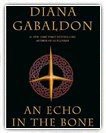Dragonfly In Amber - Gabaldon Diana (книги полные версии бесплатно без регистрации .TXT) 📗
“Well.” I tried to be encouraging. “Perhaps he’ll be a kind man.”
“That’s what I’m af-fraid of.” Avoiding my questioning look, she glanced down, twisting her hands together in her lap.
“They didn’t tell Mr. Isaacson – about P-Paris. And they say I mustn’t, either.” Her face crumpled miserably. “They brought a horrible old woman to tell me how I must act on my w-w-wedding night, to – to pretend it’s the first time, but I… oh, Claire, how can I do it?” she wailed. “And Alex – I didn’t tell him; I couldn’t! I was such a coward, I d-didn’t even say goodbye!”
She threw herself into my arms, and I patted her back, losing a little of my own grief in the effort to comfort her. At length, she grew calmer, and sat up, hiccuping, to take a little water.
“Are you going to go through with it?” I asked. She looked up at me, her lashes spiked and wet.
“I haven’t any choice,” she said simply.
“But-” I started, and then stopped, helpless.
She was quite right. Young and female, with no resources, and no man who could come to her rescue, there was simply nothing to do but to accede to her father’s and godfather’s wishes, and marry the unknown Mr. Isaacson of London.
Heavyhearted, neither of us had any appetite for the food on the tray. We crawled under the covers to keep warm, and Mary, worn out with emotion, was sound asleep within minutes. No less exhausted, I found myself unable to sleep, grieving for Hugh, worried for Jamie, and curious about the Duke.
The sheets were chilly, and my feet seemed like chunks of ice. Avoiding the more distressful things on my mind, I turned my thoughts to Sandringham. What was his place in this affair?
To all appearances, the man was a Jacobite. He had, by his own admission, been willing to do murder – or pay for it, at least – in order to ensure that Charles got the backing he needed to launch his expedition to Scotland. And the evidence of the musical cipher made it all but certain that it was the Duke who had finally induced Charles to set sail in August, with his promise of help.
There were certainly men who took pains to conceal their Jacobite sympathies; given the penalties for treason, it was hardly peculiar. And the Duke had a good deal more to lose than some, should he back a failing cause.
Still, Sandringham hardly struck me as an enthusiastic supporter of the Stuart monarchy. Given his remarks about Danton, clearly he wouldn’t be in sympathy with a Catholic ruler. And why wait so long to provide support, when Charles was in desperate need of money now – and had been, in fact, ever since his arrival in Scotland?
I could think of two conceivable reasons for the Duke’s behavior, neither particularly creditable to the gentleman, but both well within the bounds of his character.
He could in fact be a Jacobite, willing to countenance an unpalatable Catholic king in return for the future benefits he might anticipate as chief backer of the restored Stuart monarchy. I could see that; “principle” wasn’t in the man’s vocabulary, whereas “self-interest” clearly was a term he knew well. He might wish to wait until Charles reached England, in order that the money not be wasted before the Highland army’s final, crucial push to London. Anyone familiar with Charles Stuart could see the common sense in not entrusting him with too much money at once.
Or, for that matter, he might have wished to ensure that the Stuarts did in fact have some substantial backing for their cause before becoming financially involved himself; after all, contributing to a rebellion is not the same thing as supporting an entire army single-handed.
Contrariwise, I could see a much more sinister reason for the conditions of the Duke’s offer. Making support conditional on the Jacobite army reaching English soil ensured that Charles would struggle on against the increasing opposition of his own leaders, dragging his reluctant, straggling army farther and farther south, away from the sheltering mountains in which they might find refuge.
If the Duke could expect benefits from the Stuarts for help in restoring them, what might he expect from the Hanovers, in return for luring Charles Stuart within their reach – and betraying him and his followers into the hands of the English army?
History had not been able to say what the Duke’s true leanings had been. That struck me as odd; surely he would have to reveal his true intent sooner or later. Of course, I mused, the Old Fox, Lord Lovat, had managed to play off both sides of the Jacobite Rising last time, simultaneously ingratiating himself with the Hanovers and retaining the favor of the Stuarts. And Jamie had done it himself, for a time. Maybe it wasn’t all that difficult to hide one’s loyalties, in the constantly shifting morass of Royal politics.
The chill was creeping up my feet, and I moved my legs restlessly, my skin seeming numb as I rubbed my calves together. Legs obviously generated much less friction than dry sticks; no perceptible warmth resulted from this activity.
Lying sleepless, restless and clammy, I suddenly became aware of a tiny, rhythmic popping noise next to me. I turned my head, listening, then raised up on one elbow and peered incredulously at my companion. She was curled on her side, delicate skin flushed with sleep, so that she looked like a hothouse flower in full bloom, thumb tucked securely in the soft pink recesses of her mouth. Her lower lip moved as I watched, in the faintest of sucking motions.
I wasn’t sure whether to laugh or cry. In the end, I did neither; merely pulled the thumb gently free and laid the limp hand curled upon her bosom. I blew out the candle and cuddled close to Mary.
Whether it was the innocence of that small gesture, with the far-off memories of trust and safety it provoked, the simple comfort of a warm body nearby, or only the exhaustion of fear and grief, my feet thawed, I relaxed at last, and fell asleep.
Wrapped in a warm cocoon of quilts, I slept deep and dreamlessly. It was all the greater a shock, then, when I was jerked abruptly from the soft, quiet dark of oblivion. It was still dark – black as a coachman’s hat, in fact, as the fire had gone out – but the surroundings were neither soft nor quiet. Something heavy had landed suddenly on the bed, striking my arm in the process, and was apparently in the process of murdering Mary.
The bed heaved and the mattress tilted sharply under me, the bedframe shuddering with the force of the struggle taking place next to me. Agonized grunts and whispered threats came from close at hand, and a flailing hand – Mary’s, I thought – struck me in the eye.
I rolled hastily out of bed, tripping on the step of the dais and falling flat on the floor. The sounds of struggle above me intensified, with a horrible, high-pitched squealing noise that I took to be Mary’s best effort at a scream while being strangled.
There was a sudden startled exclamation, in a deep male voice, then a further convulsion of bedclothes, and the squealing stopped abruptly. Moving hastily, I found the flint box on the table and struck a light for the candle. Its wavering flame strengthened and rose, revealing what I had suspected from the sound of that vigorous Gaelic expletive – Mary, invisible save for a pair of wildly scrabbling hands, face smothered under a pillow and body flattened by the prostrate form of my large and agitated husband, who despite his advantage of size, appeared to have his hands well and truly full.
Intent on subduing Mary, he hadn’t glanced up at the newly lit candle, but went on trying to capture her hands, while simultaneously holding the pillow over her face. Suppressing the urge to laugh hysterically at the spectacle, I instead set down the candle, leaned over the bed, and tapped him on the shoulder.
“Jamie?” I said.
“Jesus!” He leaped like a salmon, springing off the bed and coming to rest on the floor in a crouch, dirk half-drawn. He saw me then, and sagged in relief, closing his eyes for an instant.




